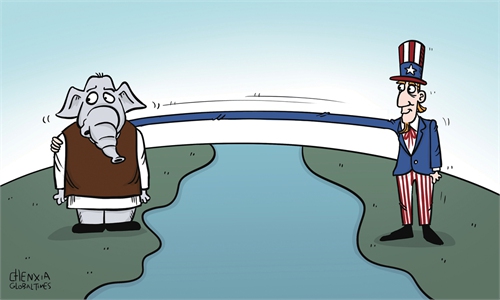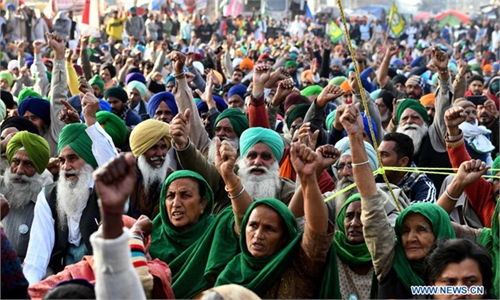
Farmers work in a field on the outskirts of Agartala, the capital city of India's northeastern state of Tripura, Nov. 20, 2021. Photo:Xinhua
While many expect Indian economy to return to a relatively fast growth track once it recovers from the pandemic, the underlying drivers needed for a sustained growth remain fragile, and the root cause behind the fragility is that the South Asian nation has barely achieved any substantial result in promoting key reforms during the past 10 years.
The latest example is the upcoming repeal of the three farm laws. After more than a year of protests by Indian farmers, the Union Cabinet is likely to approve the repeal of the three contentious farm laws at a meeting on Wednesday, Indian media reported, citing anonymous sources.
The development comes after Indian Prime Minister Narendra Modi announced on Friday that his government will scrap the farm bills to end the protests and unrest in the country. The sudden announcement of the decision marks a complete failure of India's agricultural system reform.
The Modi government in September 2020 passed the three farm laws that were supposed to boost farm output and income by introducing more market factors to the agriculture sector and allowing private traders to purchase crops directly from the farmers. Yet, farmers argued the new legislation would only leave them vulnerable to risks and exploitation by private corporations, leading to more than one year of farmers' protests outside the capital New Delhi, since the laws were enacted.
While Modi in a television address on Friday said the three farm laws failed because his government "could not convince a section of farmers despite our best efforts", it is worth noting that this is not the first time that reality is seriously out of step with seemingly ambitious plans in India's economic reforms.
In essence, the root cause behind the reform difficulties in India lies in its political and social system, which deprives the government of any capability to actually push forward with key reforms.
As there are always groups that stand to lose out in the face of reform, politicians are inclined to shun those unpopular policies for the sake of their own political interests, which, to a certain extent, may weaken the effects of certain policies. Moreover, there are different states and union territories in India, which all have their own opinions and may often oppose to the arrangement by the federal government.
Since the Indian government has limited ability to deliver on its promises, its economic reforms, in agriculture or other fields, will always suffer setbacks and sometimes even falter halfway.
Some may argue that the Modi administration has at least managed to make economic reform breakthroughs by launching the demonetization order, the Goods and Services Tax (GST) reform, among others.
However, while those reforms were laudable, their implementation was mostly flawed. The inconsistent implementation of GST tax reform has contributed to the country's financial strain, which in turn has prevented India from adopting more proactive stimulus policies. The lack of funding has also hampered the progress of large-scale infrastructure and social reform projects that were supposed to provide important growth drivers for the economy.
Moreover, reforms in crucial sectors like labor, land and agriculture are stalling, due to the obstruction of vested interest groups in the country. If India cannot transform production elements, such as its labor force, into actual comparative advantages through effective reforms, its economy will not be able to break through the structural barriers to achieve persistent growth.



